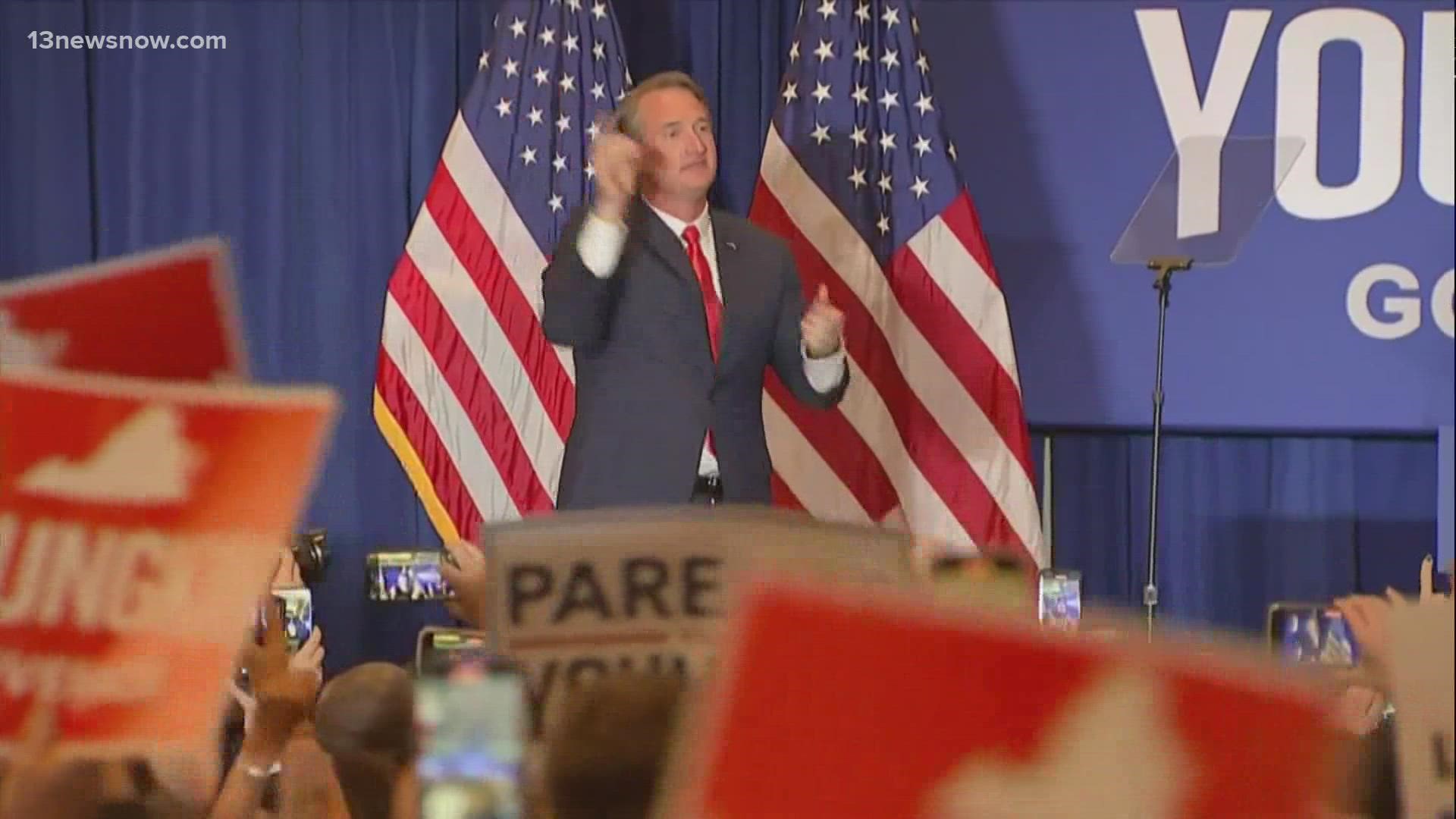NORFOLK, Va. — As he is about to take office, Virginia Gov.-elect Glenn Youngkin has signaled a new direction for how the Commonwealth addresses environmental issues.
Youngkin vowed to withdraw Virginia from the Regional Greenhouse Gas Initiative (RGGI), a regional market that seeks to cap and reduce carbon dioxide emissions from the power sector across 11 states.
According to the Environmental Protection Agency (EPA), carbon dioxide is the primary greenhouse gas emitted through human activities. The EPA said the gas accounted for about 80% of all U.S. emissions from human activities in 2019.
Virginia officially joined RGGI (pronounced “Reggie”) on Jan. 1, 2021, after Gov. Ralph Northam signed the Clean Energy and Community Flood Preparedness Act the year before.
“As the southernmost state to join RGGI, Virginia is sending a powerful signal that our Commonwealth is committed to fighting climate change and securing a clean energy future,” Northam said at the time in a news release.
But the incoming governor argued that the program is "a bad deal" for Virginia residents and businesses, and said he would use executive action to leave.
So, how does RGGI work?
According to the Virginia Department of Environmental Quality (DEQ), the state has regulations that cap carbon dioxide emissions annually. Under the program, power generators must reduce emissions to meet the cap or buy additional allowances through auctions administered by RGGI.
In Virginia, the proceeds from those auctions go to community flood preparedness, coastal resilience, and energy efficiency programs. Here's how the money is allocated under the Clean Energy and Community Flood Preparedness Act:
- Over 50% goes to energy efficiency programs for low-income Virginians
- Around 45% goes to community flood prevention and coastal resilience programs
- 3% is used for climate planning efforts by the Department of Environmental Quality (DEQ)
According to RGGI auction results, Virginia took in over $227.6 million in its first year as a member, selling over 23.7 million allowances.
Why does Youngkin want Virginia to leave?
On Dec. 8, 2021, during a speech to the Hampton Roads Chamber, Youngkin argued that RGGI is too expensive for Virginia to take part in.
“[People] who are already suffering from an overwhelming increase on the cost of living across the Commonwealth,” Youngkin said. “So that’s why people are moving away from here faster than they are the other 49 states.”
Youngkin also described RGGI as "a carbon tax that is fully passed on to ratepayers." The tweet below is from Macaulay Porter, Youngkin's press secretary:
Just two days before Youngkin's speech, Dominion Energy filed a request with the Virginia State Corporation Commission (SCC) to raise its monthly rates, citing the need to "recover costs related to the purchase of allowances." Dominion serves over 2.7 million customers in Virginia and northeastern North Carolina.
But on Monday, Dominion filed to withdraw the request "due to the uncertainty surrounding the timeline for the Commonwealth’s participation in RGGI." In the filing, the company cited Youngkin's message.
Youngkin's announcement got a mixed reaction, with Republicans praising the decision and the Democratic Party of Virginia calling it "irresponsible and short-sighted."
"Glenn refused to accept the basic science of climate change during the election and today’s announcement makes clear that he has no plan to combat climate change or invest in a clean energy future for Virginia" the Virginia Democrats tweeted.
But Republican Todd Gilbert, who is now Virginia's Speaker of the House, called it "common-sense decision making."
"When a policy costs the public a significant amount of money for no tangible benefit, that policy should be examined carefully, and if practical, rolled back," Gilbert said in a statement.
Glenn Davis, a Republican who represents District 84 in the Virginia House of Delegates, also weighed in, saying Youngkin's plan to withdraw from RGGI would bring down electric bills.
Does Youngkin have the power to do it?
Right now, it's not clear if Youngkin can unilaterally withdraw Virginia from RGGI.
On Tuesday, Virginia's outgoing Attorney General Mark Herring wrote an official opinion stating that the governor isn't legally allowed to leave RGGI through an executive order. The opinion was requested by Virginia Delegates Charniele Herring and Rip Sullivan.
"The Virginia Constitution is clear: the Governor does not have the authority to single-handedly repeal or eliminate a law or regulation that has been passed by the General Assembly," Herring said in a news release. "It is time we all work together to fight climate change and leave a better, healthier planet for future generations.”
But Victoria LaCivita, a spokeswoman for Attorney General-elect Jason Miyares, said the timing of Herring's opinion is "suspicious."
"It's odd that an outgoing Attorney General would try to influence an incoming Governor," LaCivita said. "When Attorney General-elect Miyares takes office, he and his team will look at every opinion, lawsuit, and investigation with a fresh perspective."
In an interview with 13News Now, Herring said that if Miyares wants to try to overrule his opinion, he would have to explain that to Virginia voters.
13News Now also reached out to Youngkin's transition team, but they declined to comment on this matter.
Regardless of Virginia's status in RGGI, the state is legally bound to transition its electric grid to 100% clean energy by 2050 after Northam signed the Virginia Clean Economy Act in 2020.
That law established renewable portfolio and energy efficiency standards, including Dominion being required to be completely carbon-free by 2045.

